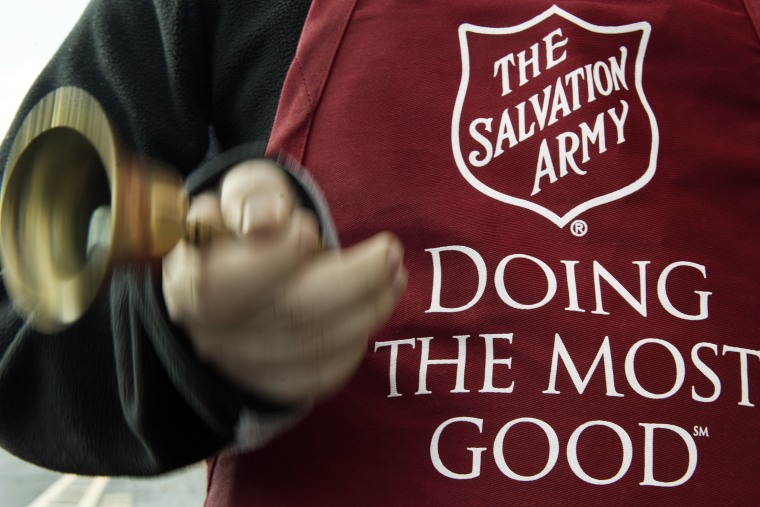A woman in Texas is claiming the Salvation Army recently denied her shelter because she is transgender.
Jodielynn Wiley last month attempted to switch from an emergency shelter program to a transitional shelter at the Carr P. Collins Social Services Center in Dallas, run by the Salvation Army, said Nell Gaither, president of Trans Pride Initiative (TPI).
Gaither -- whom Wiley first met in 2009 when she entered TPI's health care program for transgender individuals -- has assisted her with Dallas shelter options. Earlier this year, Wiley reportedly left her long-time home in Paris, Texas, to move to Dallas after enduring harassment and death threats from other residents because of her sexual orientation, according to an article in the Dallas Voice.
Wiley in February began living temporarily at the social services center, which provides men and women clients with shelter for a maximum of 30 days, a period that can be extended based on needs, Blake Fetterman, operations director at the center, told msnbc. Additionally, a transitional shelter program at the center allows clients in need to enter a six- to nine-month extended stay. But there is a wait list for acceptance into the transitional shelter.
The center is organized with separate wings designated for men and women each filled with four-person suites and shared bathrooms and common areas. About 600 individuals use the center each night, Fetterman said.
The Salvation Army is an international, faith-based charitable organization that aims to help those in need without discrimination, according to its website.
Wiley and Gaither joined a conference call with staff at the center on April 17 to discuss the transgender woman's housing options. Her stay, which had been extended several times for preferred housing options, was scheduled to end four days later on April 21.
"What they told us was she didn't qualify [for transitional shelter] because she had to have a full side," Gaither told msnbc, adding that when she asked for further explanation, the staff explained Wiley had not gone through sex-reassignment surgery.
"They didn't specify what the surgical requirement was, and I didn't ask because that's not any of our business. That's her medical information; it should not be a part of this," she said.
According to Gaither, who recalled there being a vacancy at the time of the conference call, the staff told Wiley there was a nine- to 18-month waiting period for transitional shelter.
But Wiley's plans to remain at the center in transitional shelter had not been brought up prior to the conversation on April 17, Fetterman said. Additionally, she added, the wait list included three names at the time of Wiley's request.
"We do provide services and placements consistent with the self-identified gender. ... We provide services in the best way we know how," Fetterman told msnbc. "I trust that my staff did the right thing, and they would not deny someone services based on their gender identity or gender orientation. At no point did we stop providing services to Ms. Wiley, and we would welcome her back anytime."
Employees at the center scheduled a service training with TPI members prior to the April 17 conversation with Wiley, Fetterman said. The educational guidance occurred later in the month.
"Our staff really feels like they went above and beyond and feel really good about the work they did with Ms. Wiley, as they do with all of our clients. It hurts our hearts a little bit," Fetterman said.
Prior to Wiley leaving the center, she worked with Gaither to arrange an alternative shelter plan, which allowed her to leave prior to the April 21 deadline.
"The conversation that we had on April 17 was pretty upsetting, and she wound up leaving the shelter early as soon as that conversation was over," Gaither said.
Wiley's search encouraged Gaither to create the Dallas Trans Shared Housing Project, modeled on a nationwide network that aids transgender individuals with finding shelter. Wiley, Gaither said, now "is somewhere where we can't count on it long-term, but she's in a safe place now. It's more than short-term."
Additionally, Wiley and Gaither together filed a complaint with Dallas Fair Housing, which aims to find fair and equal shelter, employment opportunities, and public accommodations for the city's residents. The motion will allow for clarity in "how the city views discrimination in the shelters and the housing programs here so that it might open up opportunities for a transgender person to take part in some of these transitional housing programs," Gaither said.
Fetterman said she had not heard about the incident prior to a Dallas Voice reporter's inquiry last month, and that she will continue to speak with members of her staff to determine if anything happened outside of the organization's practices and policies.
"We are a safe haven and we welcome anyone and everyone in our programs," she said. "We provide everyone services that they request and want in the best capacity that we can."
